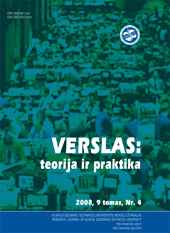Prekės kilmės šalies ir prekės ženklo kilmės šalies įtaka vartotojo požiūriui į prekę
Impact of Country of Origin and Country of Brand Origin on Consumer Attitude towards Products
Author(s): Daumantė Treigytė, Indrė PikturnienėSubject(s): Economy
Published by: Vilnius Gediminas Technical University
Keywords: Product country of origin; brand country of origin; consumer attitude; product category; consumer susceptibility to interpersonal influence.
Summary/Abstract: Increasing number of binational and hybrid products draws attention not only to the products’ country of origin (COO), but also to the country of brand origin (COBO). Although the impact of COO on consumers’ attitude towards products has been studied for decades, the COBO impact on consumer has become scholars’ interest only recently. Also it is important to determine, are there other moderators of COO and COBO impact on consumers’ attitude, for example, product category (low vs high involvement) and consumers’ susceptibility to interpersonal influence (low vs high). The main purpose of this paper was to examine the impact of COO and COBO on consumer attitude towards the product, and to determine whether it depends on product category and consumer’s susceptibility to interpersonal influence. Literature research has revealed that there is no common agreement on whether product category (high vs low involvement) influences COO or COBO importance on consumers’ decisions. There are arguments that consumers are more concerned about countries of origin when choosing high involvement product, however, other data suggests that selecting low involvement products both countries of origin are also important. It suggests the need for additional research. No data was found on interaction between COO and COBO and consumer susceptibility to interpersonal influence, thus our research fills the gap. 135 students were asked to fill in a questionnaire, which contained questions about consumer’s attitude to two products – photo camera (high involvement category) and toothpaste (low involvement category), indicating the particular COO and COBO of both products. To avoid carry-over effects, each respondent saw only one kind of COO and COBO combination (both countries are developed; both countries are undeveloped; developed COO vs undeveloped COBO country, and undeveloped COO vs developed COBO). Consumer’s susceptibility to interpersonal influence was measured using SNI scale by Bearden et al. (1989). Results indicate, that consumers have a different attitude towards products with different COO and COBO combinations. Moreover, the consumer’s attitude towards products with different country of origin and brand origin combinations does not depend on product category. However, it is dependent on consumer susceptibility to interpersonal influence. These results of the study could give useful guidelines to manufacturers that intend to change either country of manufacturing or country of corporate ownership.
Journal: Verslas: teorija ir praktika
- Issue Year: 2009
- Issue No: 1
- Page Range: 38-46
- Page Count: 9
- Language: Lithuanian

